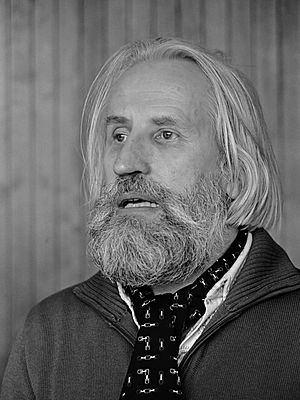Klaus Huber facts for kids
Quick facts for kids
Klaus Huber
|
|
|---|---|

Huber in 1981
|
|
| Born | 30 November 1924 Bern, Switzerland
|
| Died | 2 October 2017 (aged 92) Perugia, Italy
|
| Education | Zurich University of the Arts |
| Occupation |
|
| Organization |
|
| Awards | Ernst von Siemens Music Prize |
Klaus Huber (born November 30, 1924 – died October 2, 2017) was a famous Swiss composer and teacher. He taught music in cities like Basel and Freiburg. Many of his students became well-known composers themselves. He won a major award called the Ernst von Siemens Music Prize in 2009.
Contents
Klaus Huber's Early Life and Education
Klaus Huber was born in Bern, Switzerland. He started learning music by studying the violin and how to teach music. This was from 1947 to 1949 at the Zurich Conservatory. He also taught violin there from 1949 to 1955. At the same time, he studied how to compose music with Willy Burkhard. He later continued his composition studies in Berlin.
How Klaus Huber Developed His Music Style
Huber began composing music using a style called "serial music." This style uses a specific order of notes or sounds. His music was influenced by composers like Anton Webern. He became known internationally in 1959. This happened when his piece Des Engels Anredung an die Seele was performed in Rome. It was special because it used harmonious sounds within a strict serial style.
Huber became one of the most important composers of his time in Europe. People often compared him to famous composers like Pierre Boulez and Karlheinz Stockhausen.
What Kind of Music Did Klaus Huber Write?
Klaus Huber wrote many different types of music. He composed for small groups of instruments (chamber ensembles), choirs, solo singers, and full orchestras. His works for the theater were not typical operas.
Huber was a composer who cared deeply about society and politics. His music often shared messages about humanity. He used texts from ancient prophets and medieval mystics like Hildegard of Bingen. He also found inspiration in writings by Augustine, Ernst Bloch, and Heinrich Böll. From the 1980s, Huber started studying Arabic music and poetry. He then included these influences in his own musical works.
Klaus Huber as a Teacher and Mentor
Huber was also a dedicated teacher. He taught music history at the Lucerne Conservatory from 1960 to 1963. He also taught composition at the City of Basel Music Academy (1961–1972) and the Hochschule für Musik Freiburg (1973–1990).
He also led special composition workshops in the Netherlands. He was a visiting professor in many cities around the world. These included Paris, London, Geneva, and Montreal. Many of his students became very famous composers. Some of them are Brian Ferneyhough, Michael Jarrell, Younghi Pagh-Paan (who later became his wife), Toshio Hosokawa, Wolfgang Rihm, and Kaija Saariaho.
Klaus Huber's Published Works
Klaus Huber also wrote books about music. His collected writings were published in 1999 as Umgepflügte Zeit. He also wrote a book in 2009 called Von Zeit zu Zeit: Das Gesamtschaffen. This book was a conversation with another musician, Claus-Steffen Mahnkopf. It was later translated into English as From Time – To Time: The Complete Œuvre.
Awards and Recognition
Klaus Huber received many important awards for his music and teaching:
- 1970: Beethoven Prize for his orchestral work Tenebrae.
- 2000: An honorary doctorate from the University of Strasbourg.
- 2009:
- The Salzburg Music Prize.
- The Ernst von Siemens Music Prize, one of the most important awards in music.
- An honorary doctorate from the University of Music and Theatre Leipzig.
- 2013: The German Music Authors' Prize for his lifetime achievements in music.
See also
 In Spanish: Klaus Huber para niños
In Spanish: Klaus Huber para niños
 | Georgia Louise Harris Brown |
 | Julian Abele |
 | Norma Merrick Sklarek |
 | William Sidney Pittman |

